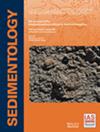水化学混合带触发碱性湖泊中的白云岩形成
IF 2.8
2区 地球科学
Q1 GEOLOGY
引用次数: 0
摘要
白云岩在过去的地质记录中普遍存在,但在现代环境中却很少见。在环境条件下有利于其降水的机制仍然存在高度争议。本研究调查了来自碱性湖Van (t本文章由计算机程序翻译,如有差异,请以英文原文为准。
Hydrochemical mixing‐zones trigger dolomite formation in an alkaline lake
ABSTRACT Dolomite is globally present in past geological records, but rare in modern environments. The mechanisms favouring its precipitation under ambient conditions remain highly debated. This study investigates sediments, containing high concentrations of early diagenetic calcian dolomite, from alkaline Lake Van (Republic of Türkiye, formally Turkey) dating back to 252 ka BP. Powder X‐ray diffraction and scanning electron microscopy evidence suggests that dolomite formation is associated with prior dissolution of aragonite and low‐Mg calcite and a subsequent co‐precipitation with, and/or partial transformation of, high‐Mg calcite into dolomite. The infrequent presence of diatom frustules encapsulated by dolomite suggests, for Lake Van, unusually low pore‐water pH at the time of dolomite formation. Conditions facilitating the preservation of silica, as well as dissolution and subsequent reprecipitation of carbonate phases, could result from periodic reventilations of Lake Van's deep water and an advection of pore fluids with contrasting redox potential and chemical concentration gradients. This continental analogue of the coastal ‘mixing‐zone’ dolomitization model argues that not overcoming a single specific hydrochemical threshold, but highly dynamic and fluctuating conditions trigger dolomite formation in Lake Van.
求助全文
通过发布文献求助,成功后即可免费获取论文全文。
去求助
来源期刊

Sedimentology
地学-地质学
CiteScore
8.20
自引率
11.40%
发文量
94
审稿时长
6-12 weeks
期刊介绍:
The international leader in its field, Sedimentology publishes ground-breaking research from across the spectrum of sedimentology, sedimentary geology and sedimentary geochemistry.
Areas covered include: experimental and theoretical grain transport; sediment fluxes; modern and ancient sedimentary environments; sequence stratigraphy sediment-organism interaction; palaeosoils; diagenesis; stable isotope geochemistry; environmental sedimentology
 求助内容:
求助内容: 应助结果提醒方式:
应助结果提醒方式:


